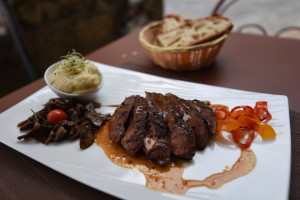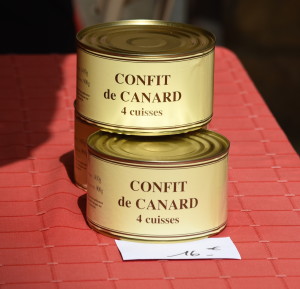Here in France’s Dordogne River Valley, every menu begins and ends with waterfowl: duck, duck, goose.
 The most prized poultry product are the livers of force-fed geese who fill the farms around the Dordogne — better known as foie gras. Duck meat is very popular, too. Ordering the basic €20 three-course menu at restaurants in Dordogne, the first course is invariably a choice between foie gras or duck gizzard salad.
The most prized poultry product are the livers of force-fed geese who fill the farms around the Dordogne — better known as foie gras. Duck meat is very popular, too. Ordering the basic €20 three-course menu at restaurants in Dordogne, the first course is invariably a choice between foie gras or duck gizzard salad.
I’m not a huge fan of foie gras — more on that later — so on my first night in Sarlat, I went with the latter. Now, my Grandma, raised in the Great Depression, always eagerly snatched up the gizzards that came with our Thanksgiving turkey. I’ve never had the nerve to eat a gizzard. But tonight, I figured, what the hey? If I like gizzards anywhere, it’ll be in Sarlat.
The salad came: a nice bed of lettuce, lightly dressed, with slices of flavorful smoked duck breast and some still-sizzling gizzards. My first bite of gizzard came with that metallic pang of organ meat. Not my favorite (I’m not that hardcore of a foodie). But not entirely objectionable, either. Mixing the different parts of the salad — greens, smoked duck breast, and gizzards — gave each forkful a more palatable balance, and by the time I was a third of the way through my salad, I had forgotten that this was a new culinary frontier. Will I order the gizzard salad the next time I go to a French bistro in Seattle? Eh, no. But I’m glad I tried it.
Then came the main course: sautéed duck breast, very flavorful, served on a bed of stewed “coriander” (cilantro) with a side of wok vegetables, giving it an Asian spin. Delicieux!
But perhaps the best part of the meal was the side of pommes de terre sarladaises — “Sarlat-style potatoes.” Thin slices of potatoes are fried up in duck fat, and loaded up with an abundance of garlic and salt. Now that’s something I could eat every day.
As for that foie gras: Here in the Dordogne, it’s only a matter of time before you have some. I’ve tried it several times, prepared many different ways. And even though I realize this will cost me my foodie cred, I have to be honest: I’m just not that into it. No matter how good it is, it always has that distinctive liver taste that hits my palate wrong.
I have a theory that, just like people either love or hate the taste of cilantro, there’s a “liver gene” that some of us have, and others don’t. Guiding our Rick Steves tours in Eastern Europe, I especially enjoy taking our groups to a family-style dinner on our first night in Hungary (Europe’s most underrated culinary destination…but that’s a topic for another time). Our tour members dig into a huge spread of Hungarian specialties, and without exception, they declare it the best meal of the trip.

But something interesting always happens: As the plate of goose liver circles the table, people either cringe and pass it on, or dig in for seconds and thirds. It’s clear to me that liver is a rare food that is not an acquirable taste: Either you love it or you hate it. And since I hate it, that means it’s wasted on me…so I’m happy to let someone else have my portion, while I stick to the duck.
The one silver lining in my distaste for foie gras is that I get to sidestep the brouhaha. Foodies get self-righteous about eating foie gras, animal-rights activists get self-righteous about condemning it, and everyone comes away with hurt feelings. Rick’s take on this resonates with me: If you hate factory farming and are opposed to the way animals are mistreated to provide human beings with food, you’re perfectly justified to rail against foie gras. But if you’re fine eating scrambled eggs or drinking milk, protesting foie gras is a wee bit hypocritical. People eat animals. If you’re OK with that, you’re OK with foie gras; if not, foie gras falls somewhere on the list of abuses of humans against animals.
On ‘force feeding’ the geese, I saw an interview with a French farmer who pointed out that ducks do gorge themselves just before migration time to store as much energy in their livers and other fat as is possible. Farmers act to ensure that the birds get as much as they can digest on a regular basis as a fattening regime.
I’ll admit that I am shameless about veal: it needs to be ‘provimi’ milk-fed for flavor and texture. It doesn’t need to be crowded indoors, however, and I have seen smaller operations that house each calf in a portable shelter with opportunity to graze or laze on a chain outside.
Anyway, you present the controversy ‘straight on’ and readers could also take the view that ‘we’re not in Kansas anymore’ and that this is an important part of local food tradition and of the local farm economy. Park our judgments at the US border!
This is going to ruffle the feathers of the vegans who read your blog, but I feel the need to post this. As an Animal Scientist at a major Land Grant University, I applaud your “to each his own” message regarding consumption of meat, milk, and eggs. But one correction, at least concerning poultry…many so-called “factory farms” are in reality family farms. And the producers and their families truly care about the health and welfare of their animals (why wouldn’t they?). In addition, many U.S. meat-bird producers are actually moving towards antibiotic-free production and the egg industry is in the process of a long-term shift away from “battery cages” to aviaries or enriched colony cages (containing perches, nest boxes, and scratch pads). And “free range” isn’t all it’s cracked up to be in the context of bird health, product safety, and especially from an environmental standpoint (e.g., carbon footprint and nutrient management issues). Plus, it represents a return to food production a la 19th Century. And that is not going to help us feed the estimated 9 billion people on this planet by 2050. But, in my mind, foie gras production is truly an animal welfare issue. When the liver accounts for up to 10% of an animal’s body weight and is infused with fat, that’s a cause for concern. And I’m not just saying this because I don’t care to eat liver, an organ referred to as “the garbage can of the body” for the many detoxification reactions it carries out. It just tastes like garbage to me.
It doesn’t matter in which country you’re dining in, using animals for our use will always result in living beings being hurt. Robert, how do people running “family farms” care about the animals they keep? What do you suppose they do with male chicks when they are born? 50% of baby chicks are of no need to the farmers so they are either ground up while alive or gassed. Is that something that you would do every day of your life before you sit down to a meal including chicken or egg?
Think of the question: “Would I want to do this to someone/have it done to me?” If not, then it is not humane. It’s that simple. How many of us would be fine with repeatedly stuffing food down a gooses throat? Paying someone else to do the deed is just as bad as doing it ourselves. Ducks might add weight before migration but it isn’t nearly to the extend of what we do to them.
Here is a link that takes just a minute to go over:
http://www.spca.bc.ca/assets/documents/welfare/foie-gras/foie-gras-factsheet.pdf
Chad – You are referring to male egg-type chicks (laying strain). Since males don’t lay eggs, the egg industry does not raise them to maturity and does, in fact, humanely euthanize them. There also are scientists trying to determine how to alter the sex of the embryos in ovo so this wasteful (and unfortunate) practice of euthanizing male egg-type chicks can be eliminated. Male meat-type chickens, however, are not euthanized after hatching; in fact, they grow faster than females. The issue of eating meat and eggs is a personal one. If you believe that it is okay to consume animals then that is fine; if you don’t that is fine also. When you anthropomorphize this subject, then the argument becomes jaded. From a physiological point of view, if humans were designed to eat plants only, they would have evolved like a ruminant animal, and would be able to digest forages and grasses like cows. But we cannot; we are omnivores by design.
Robert, how does the the egg industry humanely euthanize male chicks? Is that something that you would personally do to a chick before consuming an egg? Even in the event of scientists in the future coming up with some way of preventing chicks being ground up, that doesn’t change the current practice or the living conditions that chickens must endure for egg/meat production. Chickens do grow quickly these days; how they’ve been bred causes them great physical problems. Also, how is the word “humane” used to describe killing something that doesn’t want to be killed? Is it alright to quickly and “humanely” kill someone’s healthy pet dog or cat?
Just because it is legally someone’s choice to choose what they eat, doesn’t mean that it should be. A lot of things in the past were considered okay which we would now consider to be terrible.
Physiologically, carnivores and omnivores get excited and salivate when presented with meat. When was the last time you ate raw meat? Only when cooked with added flavours is it palatable to humans. We have evolved from animals which did eat grasses; we have not evolved into omnivores. Everything about the human body (as far as diet goes) matches up with herbivores.
I found these links interesting and would be interested to hear your take:
http://michaelbluejay.com/veg/natural.html
http://www.stevepavlina.com/blog/2005/09/are-humans-carnivores-or-herbivores-2/
This will never end so I will end it here. Au revoir.